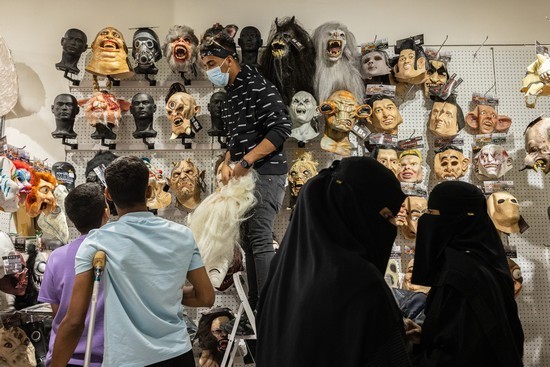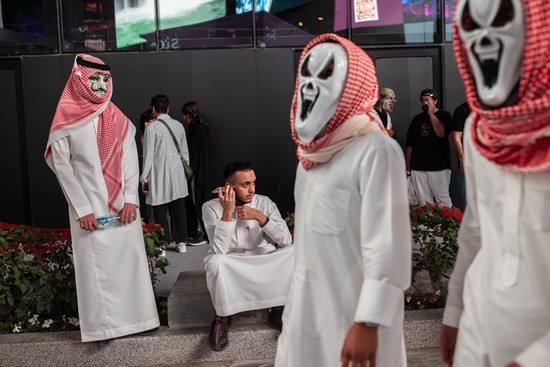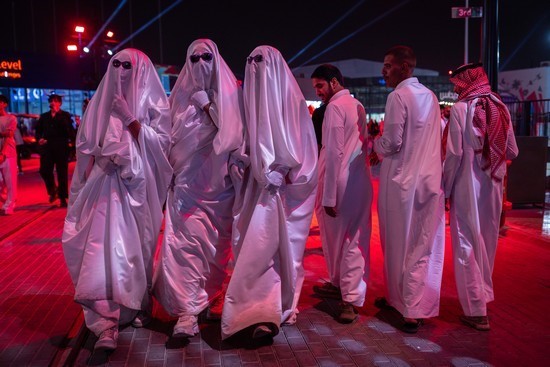RIYADH — Bathed in an eerie light, Yaser
Al-Hazzazi paused to adjust the bloodstained gauze wrapped around his head and
face. His cousin Yahya leaned in to help, untangling a loose end that dangled
over his relative’s white robe — splotched with a bloody handprint — before the
pair strolled into a crowd of people decked out in devil horns and bunny ears.
اضافة اعلان
Growing up in
Saudi Arabia, the two 21-year-old men
had never celebrated Halloween, which was variously viewed as a suspiciously
pagan foreign holiday — or as sinful, unnecessary, and weird — in the
conservative Islamic kingdom. As recently as 2018, the police raided a
Halloween party and arrested people, sending costumed women clamoring to cover
up and escape.

But this year, parts of Riyadh, the Saudi capital,
looked like creatures from a haunted house had escaped and taken over the city.
Monsters, witches, bank robbers, and even sultry French maids were everywhere,
leaning out of car windows and lounging in cafes.
The scene was a stark — and a slightly spine-chilling
— sign of the changes that have torn through Saudi Arabia since
Crown Prince Mohammed bin Salman, now heir to the throne and prime minister, began rising to
power in 2015 and started doing away with social restrictions one by one.
And the cousins, along with thousands of other
20-somethings in Riyadh who had rushed to get to the city’s costume shops
before they sold out, were thrilled by the chance to frighten each other.

“If we go back to the way we were, this wasn’t part
of our customs and traditions,” Yahya Hazzazi said as spooky music played over
loudspeakers at Boulevard Riyadh City, a sprawling complex of shops, arcades,
and restaurants that opened in 2019 as part of the government’s push to provide
entertainment. “We love to discover new things.”
This being Saudi Arabia, where strategic ambiguity
reigns as social changes sweep across the country, the government-sponsored
event was not, strictly speaking, a Halloween festival.
Instead, it was promoted as a “horror weekend”,
conveniently coinciding with the weekend before Halloween.
Like many of those swarming the entertainment
complex Thursday night — jamming the surrounding neighborhood into gridlock and
making any search for parking vain — the Hazzazi cousins wanted costumes that
would attract attention.
They threw together their makeshift mummy outfits
using medical gauze they bought at a pharmacy and improvised fake blood using
Vimto.

As they headed inside, red lights set a mysterious
mood, and decorative cobwebs festooned the bushes. Men, women, and children
clogged a look-alike Times Square, posing for photographs in front of a Dior
logo and scarfing down fries at McDonald’s.
In another part of the city, a line of wannabe
ghouls and goblins stretched down the block outside a party store selling so
many Halloween costumes that employees could barely restock fast enough. House
music thumped from the shop’s entrance, guarded by a bouncer in a black suit.
“Saudi is changing,” said Abdulaziz Khaled, 23, a
finance student waiting his turn in line. He said he planned to dress up as a
wizard this year.
Waiting beside him, Reema Al-Jaber, also 23, and
sporting caramel-blonde bangs, wanted to go as a white-winged angel for a
gathering at a friend’s house. “But I could be a black angel,” she fretted. “We
have to see what they have in stock!”
Like most Saudis, Jaber had never celebrated
Halloween growing up, though she had seen it in movies. Celebrating non-Islamic
holidays like Valentine’s Day, Christmas, and Halloween was taboo.
But forbidden foreign festivals were the least of
it.
The Saudi Arabia of Jaber’s childhood was one where
women were barred from driving, required to wear floor-length abayas in public,
and accosted by the religious police shouting at them to cover their hair and
face.
Myriad life decisions required the approval of a
male guardian, and gender segregation was enforced in offices, cafes, and many
other spaces.
In 2016, Crown Prince Mohammed announced an economic
diversification plan that called for turning the kingdom into an investment powerhouse
and global business hub. The religious police lost their authority to make
arrests and women were allowed to drive. Many of the shackles of the male
guardianship system were undone, although others still remain.
Crown Prince Mohammed, also started a push to
develop entertainment options as a new economic sector beyond oil. Many of the
58 percent of Saudis younger than 30 say they were starving for entertainment
before the changes.
Any excuse to let loose is welcomed by many young
people.
“We’re seeing what the government is doing here,
which is great, and it’s really helping the people,” said Raad Al-Kamel, 25, a
store manager at Party Experts, where Halloween is the busiest time of year.
“Maybe people just want to drop life and just party
and forget everything?” he said, wearing a tiny red demon on his shoulder. “At
least for a moment, until they come back to real life.”
Some of the revelers at Riyadh Boulevard City seemed
to have only a vague idea of what Halloween was and had come simply to enjoy the
atmosphere.
Abdulaziz Al-Otaibi, 24, had orchestrated matching
outfits with two friends. The trio had draped themselves in shiny white fabric
from head to toe, with purple-rimmed sunglasses.
He seemed unsure when asked what he thought about
Halloween — “You mean these activities?” he said. Regardless, he was having a
grand time with his friends, hamming it up for pictures.
“I was born in this life, and I didn’t expect it to
change, ever,” he said. “But it changed, and it’s a good thing.”
Read more Region and World
Jordan News



